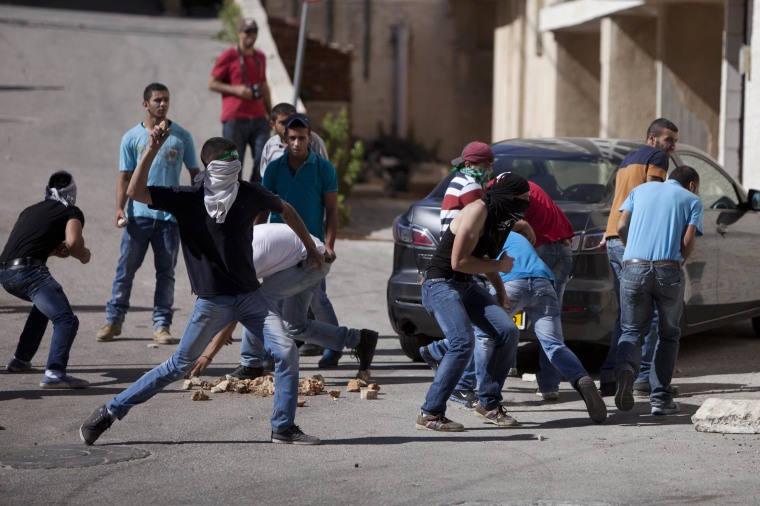With the latest cease-fire proposals having fallen apart, missiles are once again pounding Gaza — and calls are growing for Palestinians on the West Bank to rise up in arms against Israel.
Three days after Hamas issued their first appeal, asking for what they called a "Day of Rage" on the West Bank to lead to the third Intifada, Israeli security services are preoccupied with the question: Is the third Intifada about to explode?
That is, are Palestinians on the West Bank about to pour into the streets, armed with rocks and rage or grenades and suicide belts, in another uprising against Israel?
The answer may be found in the response to Hamas' call.
On Thursday night it looked possible, when up to 20,000 Palestinians marched against the Qalandia check post, which is manned by Israeli soldiers on the road from Ramallah to Jerusalem. A pitched battle ensued resulting in the death of one Palestinian who was shot by an Israeli soldier.
This was followed on Friday by demonstrations in Nablus and Hebron, where the Palestinian death toll rose to seven Palestinians killed, six by Israeli soldiers and one by a Jewish settler, who shot at rock-throwers from his car.
But then the protests then fizzled. One Palestinian, when asked on Friday whether he would march again on Qalandia, answered, "Again? We did it yesterday."
There appears to be little desire among West Bank Palestinians to take up Hamas's challenge.
So, what is different today from the situation surrounding the first Intifada in December, 1987, or the second Intifada in September, 2000?
First, and key, is the Palestinian's leader. When the two Intifadas broke out, both more or less spontaneously, Yasser Arafat quickly realized he had better get in tune with the street and he took ownership of the uprising. With words, money and action, dressed in military fatigues and his trademark keffiyeh scarf folded in the shape of Palestine, he encouraged the violence.
Today’s Palestinian President, Mahmoud Abbas, is made from different cloth. He wears a dark suit and is a man of peace. Although he accompanied Arafat from the early days of the PLO, he always preached non-violence, and he still does.
He believes no less in the right of Palestinians to a state of their own, but does not believe that violence will achieve that goal. So in all likelihood, he will not finance or encourage a violent confrontation with Israel. His police would probably act to stop it. Israeli security sources say cooperation with Palestinian security services on the West Bank has rarely been tighter.
Second, whereas on the eve of the second Intifada there was a reservoir of armed militants, today they are unarmed; their weapons were long ago confiscated by Palestinian police.

In fact, many of the militants became policemen to get a salary and stability in their lives after years on the run.
Third, 14 years ago the Arab world rose in popular support for the Palestinian Intifada, staging huge demonstrations in Arab capitals.
Today the Arab world is in such turmoil that demonstrations in their support are small and scattered. There are larger pro-Palestinian demonstrations in London and Paris than in Cairo or Damascus.
Fourth, then there were Israeli military roadblocks throughout the West Bank, providing juicy targets for rock-throwers and suicide bombers. Today, they are few and far between, which makes it harder for militant Palestinians to find Israelis to target.
Moreover, the Israeli wall and fence that cuts the West Bank off from most of Israel stops Palestinians with guns, car bombs and suicide bombs. In the last Intifada there was little to stop a Palestinian from building a car bomb in Qualkilya or Tulkarem, and then driving along Highway 57, a straight shot to Netanya, a mere nine miles from the West Bank border. The town of about 200,000 people was hit by suicide bombers fifteen times in two years.
And finally, more key questions: Are Palestinians better off today, financially? Do they have more hope for their future, less frustration with their lot in life? Are they less primed to protest?
I cannot presume to answer for them. But the proof of the pudding is in the lack of violent support among Palestinians in the West Bank for their cousins in Gaza.